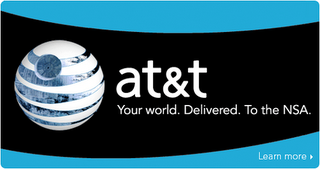Reach out, reach out and bug someone...
The anecdotal "Law of Unintended Consequences" generally refers to, but is not limited to, negative unintended results and is rarely used in conjunction with positive ones. That may be more a result of folks pretending that positive results were planned all along, or merely that when faced with negative results we're much more likely to shift attention from our own lack of foresight to a higher power, be it Murphy's Law or God. For the purposes of today's discussion, I posit that the capital-I Internet was one such unintended positive result for both AT&T and the U.S. Government.
Backstory:
The Internet as you know is a direct yet unintended result of the government's breakup of AT&T in 1984.
With the assistance of several universities and a partnership with AT&T (who owned the telecommunications infrastructure) the protocols and procedures that form the basis of the modern Internet were constructed in the late 1960's, under the sponsorship of the Department of Defense. This first packet-switched network was named ARPANet (Advanced Research Projects Agency Network) and the first link between two computers occurred in October of 1969, when a brief message was sent between operators in UCLA and Stanford University.
By 1981 there were a whopping 213 sites, with a new site being added every month or so. Universities were coming online, and both the D.O.D and the universities were taking full advantage of AT&T's monopoly of the nation's telecommunications infrastructure to make it happen quickly and consistently. It was especially helpful for the D.O.D. that they merely had to deal with one company to manage the security implications of the government's electronic communications.
Yet it was that very monopoly that spurred the Department of Justice to file anti-trust lawsuits against the Bell monolith. In 1974 the D.O.J filed its third anti-trust suit (AT&T was by necessity a monopoly for most of its existence and had negotiated its status with the D.O.J. in 1956) which was settled in 1982, and took effect January 1st, 1984. In the settlement of that suit, Ma Bell traded its control of the many regional Bell Companies in exchange for the ability to enter the computer markets that is was coveting but had been legally barred from entering.
*YAWN* you say to me. "Big whoop. Where's the unintended consequence of all this?" Well, once the mother-telephone company divested to become seven independent Baby Bells, the ARPANet ceased to be a particularly valuable project for the D.O.D. It was too difficult to maintain the security of the network once it was spread across 7 autonomous telephone networks, so much so that the military decided to let it go. They spun off their military operations into a newer, second-generation network called MILNET, and ceded their stake in the ARPANet to the public interest. The universities that were its primary users became the de-facto owners of the fledgling global sensation and the government got itself out of all this internetting business, leaving it to the rest of us.
We've had a lovely time enjoying our Internet all these years, of course. Yet all that freedom is bound to get people fidgety. Now that there's big money to be made and lost due to the heretofore neutral Internet, both the government and the telecommunications companies, and especially the content-providers such as the Recording Industry of America and the Motion Picture Association of America, figure it's time to step in and ensure people are watching the requisite number of advertisements and not being too intemperate with their digital rights. (Check out boingboing.net for a terrific ongoing exploration of the suppression of technology and freedom being attempted for your own good.)
What You Need To Know:
After 22 whole years of not being a monopoly, AT&T's back!
"But Chief," you ask, "if it was a monopoly in 1984, and it's re-absorbed half of what it was forced to spin off, and now also includes huge stakes in cellphones and cable systems, why isn't it just as much of a monopoly today? Why isn't the government blocking these acquisitions!" Well, I can only guess there may have been some kind of arrangement. The government agreed to leave well enough alone in exchange for something. But whatever could a telecommunications monopoly have to offer the government that would be worthwhile?
This collusion of our government with the gatekeepers of the Internet is very dangerous to the exciting Internet we've all come to love. Technology is being retarded to ensure you cannot have for free what they want you to pay for. You're forced to watch more and more advertisements and protections for big media's old business model are being written into communications laws by cooperative politicians. Worst of all, with more of our lives being lived online, the lack of integrity of the service providers we choose has become more and more significant.
 22 years ago neither the government nor AT&T was terribly concerned about relinquishing control of the Internet. Now, with a war on terror to conduct the government is all over any opportunity to collect information on, well, practically everyone. The re-aggregation of a significant portion of the Internet's infrastructure back under the control of a single very cooperative organization is an ominous turn of events on its own, when combined with a government that expects to get a lil' something-something in return for its patronage it becomes downright disturbing.
22 years ago neither the government nor AT&T was terribly concerned about relinquishing control of the Internet. Now, with a war on terror to conduct the government is all over any opportunity to collect information on, well, practically everyone. The re-aggregation of a significant portion of the Internet's infrastructure back under the control of a single very cooperative organization is an ominous turn of events on its own, when combined with a government that expects to get a lil' something-something in return for its patronage it becomes downright disturbing.
Backstory:
The Internet as you know is a direct yet unintended result of the government's breakup of AT&T in 1984.
With the assistance of several universities and a partnership with AT&T (who owned the telecommunications infrastructure) the protocols and procedures that form the basis of the modern Internet were constructed in the late 1960's, under the sponsorship of the Department of Defense. This first packet-switched network was named ARPANet (Advanced Research Projects Agency Network) and the first link between two computers occurred in October of 1969, when a brief message was sent between operators in UCLA and Stanford University.
By 1981 there were a whopping 213 sites, with a new site being added every month or so. Universities were coming online, and both the D.O.D and the universities were taking full advantage of AT&T's monopoly of the nation's telecommunications infrastructure to make it happen quickly and consistently. It was especially helpful for the D.O.D. that they merely had to deal with one company to manage the security implications of the government's electronic communications.
Yet it was that very monopoly that spurred the Department of Justice to file anti-trust lawsuits against the Bell monolith. In 1974 the D.O.J filed its third anti-trust suit (AT&T was by necessity a monopoly for most of its existence and had negotiated its status with the D.O.J. in 1956) which was settled in 1982, and took effect January 1st, 1984. In the settlement of that suit, Ma Bell traded its control of the many regional Bell Companies in exchange for the ability to enter the computer markets that is was coveting but had been legally barred from entering.
*YAWN* you say to me. "Big whoop. Where's the unintended consequence of all this?" Well, once the mother-telephone company divested to become seven independent Baby Bells, the ARPANet ceased to be a particularly valuable project for the D.O.D. It was too difficult to maintain the security of the network once it was spread across 7 autonomous telephone networks, so much so that the military decided to let it go. They spun off their military operations into a newer, second-generation network called MILNET, and ceded their stake in the ARPANet to the public interest. The universities that were its primary users became the de-facto owners of the fledgling global sensation and the government got itself out of all this internetting business, leaving it to the rest of us.
We've had a lovely time enjoying our Internet all these years, of course. Yet all that freedom is bound to get people fidgety. Now that there's big money to be made and lost due to the heretofore neutral Internet, both the government and the telecommunications companies, and especially the content-providers such as the Recording Industry of America and the Motion Picture Association of America, figure it's time to step in and ensure people are watching the requisite number of advertisements and not being too intemperate with their digital rights. (Check out boingboing.net for a terrific ongoing exploration of the suppression of technology and freedom being attempted for your own good.)
What You Need To Know:
After 22 whole years of not being a monopoly, AT&T's back!
"But Chief," you ask, "if it was a monopoly in 1984, and it's re-absorbed half of what it was forced to spin off, and now also includes huge stakes in cellphones and cable systems, why isn't it just as much of a monopoly today? Why isn't the government blocking these acquisitions!" Well, I can only guess there may have been some kind of arrangement. The government agreed to leave well enough alone in exchange for something. But whatever could a telecommunications monopoly have to offer the government that would be worthwhile?
This collusion of our government with the gatekeepers of the Internet is very dangerous to the exciting Internet we've all come to love. Technology is being retarded to ensure you cannot have for free what they want you to pay for. You're forced to watch more and more advertisements and protections for big media's old business model are being written into communications laws by cooperative politicians. Worst of all, with more of our lives being lived online, the lack of integrity of the service providers we choose has become more and more significant.
 22 years ago neither the government nor AT&T was terribly concerned about relinquishing control of the Internet. Now, with a war on terror to conduct the government is all over any opportunity to collect information on, well, practically everyone. The re-aggregation of a significant portion of the Internet's infrastructure back under the control of a single very cooperative organization is an ominous turn of events on its own, when combined with a government that expects to get a lil' something-something in return for its patronage it becomes downright disturbing.
22 years ago neither the government nor AT&T was terribly concerned about relinquishing control of the Internet. Now, with a war on terror to conduct the government is all over any opportunity to collect information on, well, practically everyone. The re-aggregation of a significant portion of the Internet's infrastructure back under the control of a single very cooperative organization is an ominous turn of events on its own, when combined with a government that expects to get a lil' something-something in return for its patronage it becomes downright disturbing.

0 Comments:
Post a Comment
<< Home